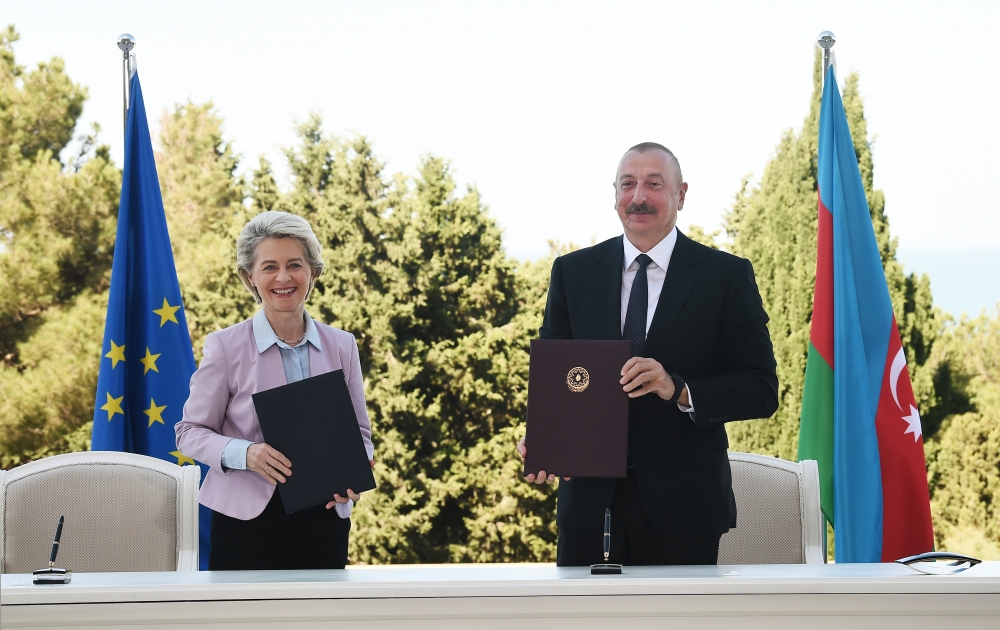Eastern European Strategy of Azerbaijan: View from Baku
Azerbaijan and Eastern Europe
This week, the prime minister of Slovakia and the president of Bulgaria visited Baku on official visits. Recently, Azerbaijan has been paying special attention to developing relations with Eastern European countries. According to political analysts, the cooperation between Baku and the countries of the region is based not only on economic and energy transportation issues but also on common security interests.
- “Moscow must accept the new realities in the region.” A view from Baku
- Foreign ministers of Armenia and Azerbaijan hold direct talks in Almaty: Expert predictions
- Threats, insults, beatings. Why has the ruling party of Georgia declared war on activists? Expert commentary
Experts from the Azerbaijan Center for the Study of the South Caucasus have analyzed the relations between Baku and Eastern European states.
Azerbaijan’s Eastern European strategy
“Relations with Eastern European states constitute one of the important directions of Azerbaijan’s foreign policy course. Several factors underlie the developing relations with countries in the region:
- Common history – belonging to the former socialist bloc;
- Common challenges – strengthening sovereignty concurrently with reducing risks of external interference and dependence;
- Pragmatic approach – building external ties not on ideological principles but based on national interests.
Azerbaijan’s relations with Eastern European countries are characterized by their multifaceted nature. Besides economic ties, cooperation in politics and security also exists between the parties.”
Economic partnership
“Eastern European countries hold a special place among the purchasers of energy resources from Azerbaijan. Greece, Croatia, Romania, and the Czech Republic purchase Azerbaijani oil. Thanks to the implementation of the Southern Gas Corridor project and the construction of regional gas interconnectors, blue fuel from Azerbaijan is currently supplied to five Eastern European countries – Greece, Bulgaria, Romania, Hungary, and Serbia.
Negotiations are underway for gas transportation with Slovakia and Albania, while there are plans to increase the volume of gas transported to existing buyers. Official Baku, alongside supporting efforts to diversify energy sources of regional states, participates in the formation of modern internal energy infrastructure in these countries through investments and knowledge exchange.
Simultaneously, Azerbaijan is conducting joint work in the field of green energy with Eastern European countries. Through a 1200-kilometer cable laid along the bottom of the Black Sea, green energy produced in Azerbaijan is planned to be transported to countries such as Hungary, Romania, and Bulgaria.”
Political and military cooperation
“The political and military cooperation between Eastern European countries and Azerbaijan is driven by common issues such as territorial integrity, sovereignty, and security threats. Regional powers play an important role in neutralizing attacks on Azerbaijan in European and international structures. Recently, Slovakia and Bulgaria joined the group of Eastern European countries (Hungary, Croatia, Bosnia and Herzegovina, Romania, Serbia) that are strategic partners of official Baku, with coinciding interests playing a key role in this.
Azerbaijan’s cooperation with the countries of the region in defense and security is expanding. Examples include agreements with Slovakia, particularly in joint weapons production. Additionally, a contract has been concluded with Serbia for the acquisition of 48 Nora B-52 howitzers, and with the Czech Republic for the purchase of 70 DITA howitzers.”
Conclusion
“At present, Baku seeks to develop relations with Eastern European countries in various fields. For Azerbaijan, this region is important not only as a stable market for energy resources but also in terms of security.
There are prospects for cooperation between Azerbaijan and Eastern Europe in the field of logistics as well. For Azerbaijan, which does not have access to open seas, it is important to increase export and transit opportunities through sustainable connections with countries on the shores of the Black, Aegean, Adriatic, and Mediterranean Seas.
Moreover, unlike some Western European states, Eastern European countries respect Azerbaijan’s fair position and understand its problems. These states advocate for equal partnership relations with Baku.
It is for these reasons that cooperation with this part of Europe best serves Azerbaijan’s interests.”




















